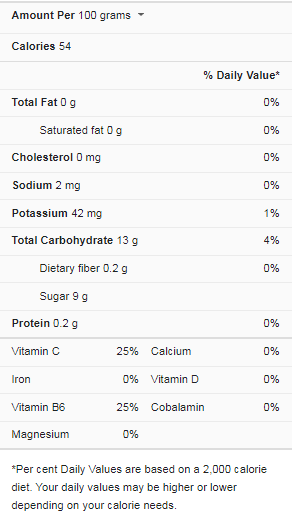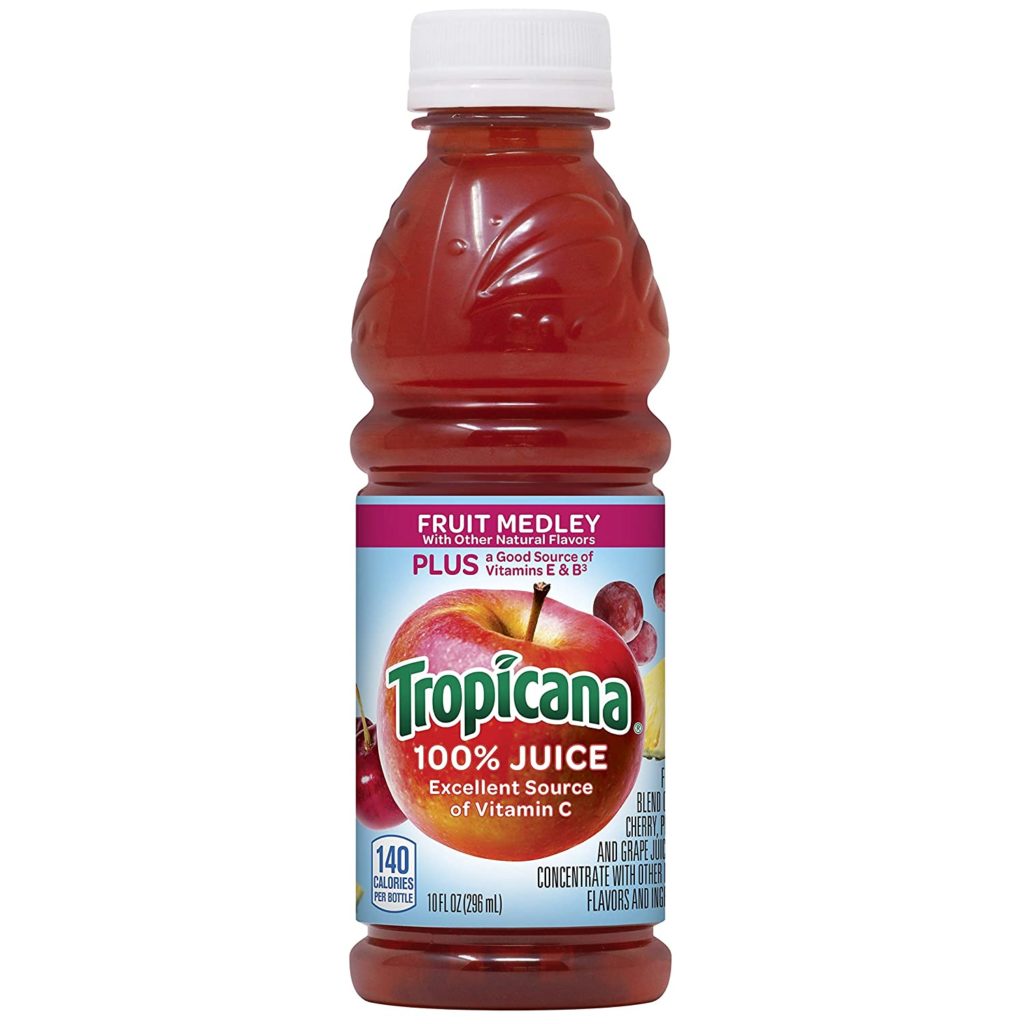Fruit juice is always good because it has all the nutrients you need while keeping you hydrated. You can feel better about your overall health. Fruit juice can help to enhance the immune system while also being a health promoter and disease preventer. Fruit juice is extracted from the fruit’s flesh or the entire fruit, and fruit juice is made in various ways depending on the fruit.
Still, many manufacturers smash or “press” the fruit to extract the juice, then pasteurize or add preservatives before packaging the finished product. Even though many fruit juices have health benefits, drinking too much of them can lead to health problems such as weight gain or changes in blood sugar levels.
Fruit Juice Nutrition Facts
Fruit Juice’s Health Benefits
Fruits and fruit juices are considered healthful and should be included in one’s regular diet. However, one must be careful about how and when they are consumed for the best nutritional results. According to nutritionists and lifestyle educators, this is because fruit juices are high in sugar, which can induce a rise in blood sugar levels and an insulin spike, resulting in a high-fat percentage in the body and, as a result, weight gain.
Increased Vitamins and Minerals in your Diet
Juicing can supply your body with a healthy dose of vitamins and minerals that you might be lacking from your diet otherwise. Vitamins and minerals are beneficial to your health if you haven’t noticed. They assist us in many ways, including growth, thinking, and working. It’s possible that your body isn’t performing to its maximum potential if you’re deficient in many vital vitamins and minerals.
If you don’t want or don’t want to eat your fruits and veggies whole, juicing is a fun way to include them in your diet while getting all the vitamins and nutrients your body requires.
Possibility of Weight Loss
Juice might help you lose weight if you include it in your diet. Your morning, afternoon, or evening juice may contain fewer calories than your usual snacks, depending on your fruits and vegetables. In many circumstances, this indicates that you are calorie deficient, which is an excellent way to lose a few pounds.
Although we advocate eating nutritious meals throughout the day, juicing is a terrific (and tasty) way to make up for any fruits and veggies you may be missing.
Increased Energy
We’ve been accustomed to the routine: get up, get ready, grab a coffee on our way out the door, and start our day. Have you discovered that you’re a little too reliant on caffeine? Maybe you’re not a morning person or get tired about 2 p.m. Juicing is a fantastic way to get more energy without relying on caffeinated beverages.
Incorporating more B vitamin-rich foods into our diet is one of the numerous ways we can boost our energy levels. Leafy greens, citrus fruits, beets, ginger, and other foods fall. Juicing is a quick, healthful, and convenient way to consume essential B vitamins.
Decrease Inflammation & Reset your Body
Because of its anti-inflammatory effects, juicing may be a good supplement for you if you’re suffering from pain or inflammation of any form. Antioxidants can be obtained by eating darker, leafy green vegetables and foods high in vitamin C. Maintaining a diet rich in nutrient-dense fruits and vegetables provides you an advantage over inflammation, potentially lowering adverse effects.
Fresh juice cleanses a terrific approach to help you refresh your body and start over if you need a body reset. Although your body has mechanisms that help you get rid of impurities, juice can help you get a jump start on your cleanse.
Protect Against Disease
Drinking juice made from various fruits and vegetables will help you get more nutrients by introducing vitamins and minerals into your body. These are essential in preventing heart disease, diabetes, digestive problems, immune system problems, high blood pressure, etc. Green juice, in particular, can aid in the removal of toxins from the body when combined with a good diet and regular exercise!
Free radicals put many people at a higher risk of disease, and phytochemicals in the juice can dissolve them in the body. Although green juice will not lower your healthcare costs, it will help you avoid numerous preventable ailments. Juicing is an excellent choice if you don’t typically consume fruits and veggies.
Is it Safe to Drink Fruit Juice daily?
There is one silver lining: fruit juice contains nutrients. Drinking no more than five ounces of alcohol per day has been associated with a lower risk of heart disease and stroke in studies. So while a small amount of fruit juice appears to be safe, too much sugar from any source, including juice, has been related to adverse health results. Too much juice, on the other hand, can be an additional source of sugar and calories. In addition, juice lacks the fiber and phytonutrients found in raw fruits.
As a result, many experts advise limiting yourself to one juice serving per day. It’s critical to keep your nutritional balance between staying healthy. Obesity is connected to high blood pressure, stroke, diabetes, heart problems, and other unfavorable health conditions later in life. Sugar in your juice should be avoided at all costs.
Is it Possible to Consume Juice on an Empty Stomach?
Drinking juice on an empty stomach is optimal, and if you drink it multiple times a day, make sure you drink it at least 20 minutes before or two hours after a meal. Why? Juice has the most significant impact on vitamin and nutrient absorption when your stomach is empty. Fruit juice has more concentrated sugar and calories, leading to obesity and unnatural weight gain.
Excessive weight gain is linked to high blood pressure, hypertension, stroke, diabetes, and other long-term health problems. Fruit juice is best consumed in the first half of the day because it will provide you with the energy you need to get through the day.
What are the Effects of Fruit Juices on the Body?
Juicing lowers your cancer risk, improves your immune system, removes toxins from your body, aid digestion, and promote weight loss. True, 100% fruit juice is a good source of nutrients such as vitamin C and potassium. Too much juice, on the other hand, can be an additional source of sugar and calories. In addition, juice lacks the fiber and phytonutrients found in raw fruits. When you first start, you’re giving your body a lot of nutrient-dense fruits and veggies. Your body (specifically your liver and kidneys) will go into overdrive to eliminate toxins while simultaneously beginning to develop newer, healthier tissues.
Low energy, headaches, and joint pain are all possible side effects. Consuming large volumes of fruit juice regularly has been linked to an elevated risk of metabolic syndrome and obesity. Furthermore, there is no proof that your body requires detoxification by avoiding solid foods. The liver and kidneys are designed to help your body clear poisons on its own.
How Much Fresh Juice Should I Consume daily?
Several servings of juice per day can supply crucial nutrients to persons who cannot eat solid fruit due to illness. However, most suggestions suggest that we drink no more than 3/4 to 1 cup of fruit juice per day for the rest of us. If you want to minimize blood sugar spikes, choose whole fruits over processed fruits. When you have a juice craving, follow Harvard experts’ advice and limit your juice intake to 8 oz. per day. Juices and sports drinks are also hydrating; diluting them with water lowers the sugar content.
Coffee and tea are included in your total. Many people assumed they were dehydrating, but this is no longer the case. The diuretic impact does not compensate for the lack of fluids. A juice’s nutritional worth isn’t improved by adding water, and it merely raises the amount of the fruit or vegetable while diluting its concentration. When using a juicer, there is no need to add water. This device can extract fresh juice directly from the ingredients and does not require any liquid to function.
Conclusion
Many fruit juices contain nutrients and antioxidants that aid in maintaining a healthy lifestyle. Fruit juice may help decrease the pain of arthritis while also lowering your risk of developing severe disease. Because orange juice, apple juice, and melon juice are low in fat, they may help lower cholesterol levels. There is evidence that cranberry juice, high in antioxidants, may help prevent urinary tract infections and maintain a healthy cardiovascular system.
Vitamin C, commonly known as ascorbic acid, is an essential nutrient found in various fruits. Because our bodies don’t produce or store Vitamin C, we need to make sure we get enough of it in our diets to support wound healing, strong teeth and gums, and a robust immune system. Vitamin C is abundant in juices made from oranges, grapefruit, pineapple, strawberries, raspberries, and blackcurrants.




